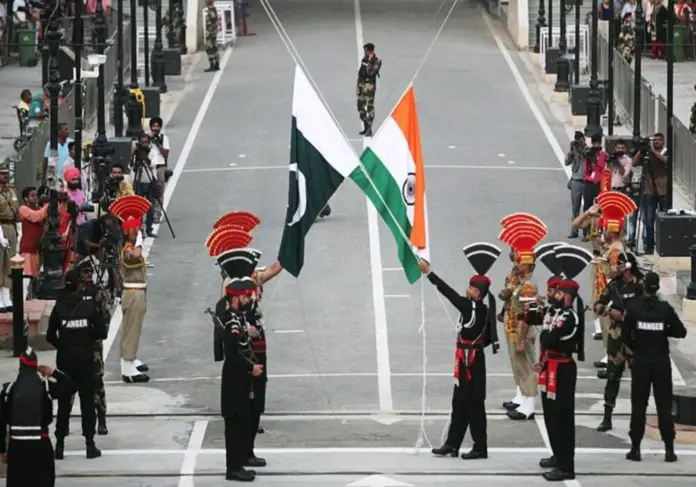Pakistan and India obtained freedom from British rule in August 1947. India is the world’s second biggest population. Tensions between Pakistan and India are part of their histories. The main conflict between Pakistan and India is Kashmir. The conflict in Kashmir began when the Hindu Maharaja Hari Singh announced Kashmir’s annexation to the state of Jammu.
In response, the Pakistani army and some mujahideen attacked Kashmir and took a part of the land of the Kashmir valley. India went to the UN Security Council, and the United Nations adopted two resolutions on August 13, 1948 and January 5, 1949. The resolution of the United Nations Commission for Pakistan and India states, “The question of joining the state of Jammu and Kashmir will be resolved in a free and impartial plebiscite.”
Although Pakistan and India have not had good relations in the past, the future of 1.5 billion people requires peace. Pakistan and India make up one/fourth of the world’s population, and both are nuclear powers. Peace between Pakistan and India is not only beneficial to both countries, but it is also important to the whole world. Due to the uncertainty at the border, both countries spend enormous amounts of money on defence. The money that we need to spend on education and healthcare is used to produce bombs and high-explosive rockets.
If Pakistan and India start trading it will change the lives of people on both sides. Both countries will gain new markets, their business will grow, and the region will become the most developed and powerful economic centre in the world. The Pakistan-India relationship has deteriorated, and it has never remained stable. Sometimes, the relations between Pakistan and India become very tense. Political and military leaders of both countries blame each other. Many people get excited about the idea of a war and want to teach each other a lesson.
In my opinion, the war will be destructive to the economies of both the countries. Pakistan and India should not be fascist or totalitarian countries. Peace is essential for both the countries. Moreover, there is a danger of a nuclear attack that could destroy any country. India has threatened, many times, to block Pakistani rivers with water sourced from India. The Indian army opens fire on the Line of Control and kills Pakistani soldiers. Hatred and anger are high on both sides.
War can be devastating for the economies of both the countries. India is never ready to talk. Without going into a lengthy discussion of the causes of the deep-seated distrust and hostility in Pakistan-India relations, conclusions can be simplified by blaming them on ‘history’, ‘unresolved issues’ and ‘lack of will in military-political policy’.
There is also ample evidence to suggest that some ‘other’ parties are not much interested in conciliating or easing relations between the two subcontinental neighbours due to their own political and economic interests.
Pakistan and India have experienced seven decades of serious enmity and have fought four wars during this period. The failure of the two countries to resolve their conflicts, especially the Kashmir issue, led to provocations by non-state actors created during the Afghan jihad. Those people continued their activities without any serious attention from the international community until September 11, 2001. Pakistan took serious action and banned some organisations like Lashkar-e-Taiba, Jaish-e-Mohammed, Sipah-e Muhammad, Sipah-e-Sahaba, Harkat-ul-Mujahideen, and some other sectarian organisations.
The banned organisations changed their names and continued to operate for several years. They have developed their social structure and engage in public services in remote, underdeveloped areas. After gaining popularity, some of them organised themselves politically and participated in elections.
The question of Kashmir’s sovereignty is once again placed at the heart of the agenda of Pakistan-India relations. The Pakistan People’s Party (PPP), in government from 2008-2013, avoided making the Kashmir issue a priority in its dialogue with New Delhi in 2011-2013. On the contrary, the government called for a “freeze”, while solving some problems-technical matters, visas (providing urgent visa regimes for certain categories of citizens of both countries), and transportation (bus routes in Kashmir).
Mian Nawaz Sharif and Narendra Modi first met in May 2014 at the latter’s inauguration ceremony in New Delhi, but the first political battle started between them in September 2014 at the UN General Assembly.
Pakistan has harshly criticised India’s position to prevent the implementation of the referendum in Kashmir. The main charge of the Indian side boils down to calling Pakistan the “main source of terrorism” on its soil. It is important to note that India favours the anti-Pakistan religious element. US Defence Secretary Chuck Hagel in 2011 even suggested that India was engaging in terrorism activities from Afghanistan.
Some reports suggest that the TTP is receiving financial support from India. India’s National Security Adviser also accepted the allegation when he said that the Taliban are mercenaries and could be used against Pakistan if given lots of money. The international community can continue to encourage and facilitate an uninterrupted peaceful dialogue between Pakistan and India. India has always scorned foreign mediation and favours a bilateral engagement where it can carry more weight. This has continued even though the involvement of the United States in the Kargil crisis was entirely in India’s favour. Pakistan, which has in the past tried to call for international conciliation in its disputes with India, may also be wary of any outside intervention following its experience in Kargil.
The Indian government has delayed the implementation of the relaxed visa regime. This discourages future sporting contacts with Pakistan. The head of the Indian army and the prime minister both made vehement statements. However, Pakistan’s foreign minister has suggested ministerial-level talks to reduce tensions.
It is generally assumed that the Indian government, the opposition, and the media should oppose the policy of opportunism for the broader national interest of its people and country. Steps have been taken many times to improve relations between the two neighbours, but unfortunate incidents on both sides of the border have derailed these efforts.






